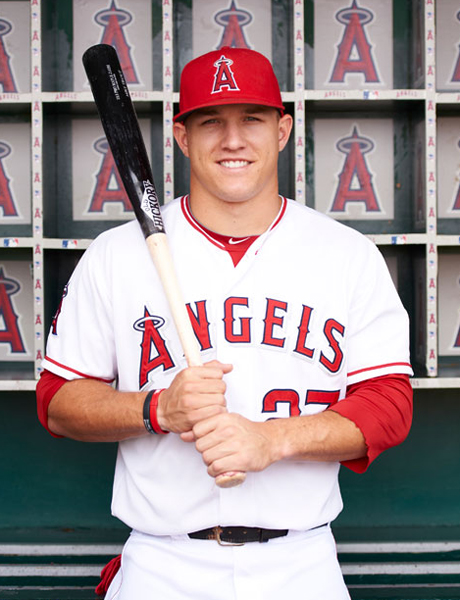On Mike Trout and Megabucks Contracts

12 years. $430 million. Those are the terms of Mike Trout’s extension with the Los Angeles Angels. If honored in full, they should serve to make Trout an Angel for the remainder of his career. The deal is also be the biggest in baseball history, eclipsing those of Bryce Harper (13 years/$330M), Giancarlo Stanton (13 years/$325M), and Manny Machado (10 years/$300M).
For those who aren’t baseball fans and maybe even so, this might seem excessive. $430 million? For a game children play? We should all scoff—scoff!—at such exorbitant sums. No player is worth that much—even Trout. Right?
And yet, if you were to ask someone like Sam Miller of ESPN, he would tell you that a closer approximation of his value is at least twice that much, perhaps even $1 billion. Yes, that’s “billion” with a “B.” Is he serious?
Very. First, let’s address the “it’s a game” criticism. If you’re comparing sports contracts with other arrangements outside this purview, you’re putting apples and oranges side by side. I’m not about to suggest teachers, for example, don’t deserve to be paid their fair share. Theirs is a meritorious role in our society. Still, organized sports are big business. Despite lower overall attendance than in the previous year, Major League Baseball saw record revenues in 2018 to the tune of $10.3 billion. The value of star athletes like Trout is tied to the value of their sports at large. If you don’t like that, don’t watch.
Unsatisfactory as you may find this rationalization, let’s nevertheless limit our focus to the salaries of baseball players. Miller’s thinking on Trout is based on the going rate of wins added through free agency and projections of Trout’s WAR over the remainder of his contract. With the reasoning that a win added is worth at least $10 million and Baseball Prospectus’s PECOTA system forecasting a rating of 85 WAR over those 12 years, getting Mike Trout at $430 million rather than $850 million is a steal. This is besides the notion that since he entered the league, Trout has been the most valuable player in the league—and it hasn’t been all that close either.
Moreover, our failure to appreciate Trout for the $80 million-plus-per-year player he is itself is a failure to adequately appreciate considerations of economics and organizational value for all players. On the first count, cultural norms serve to outweigh our earlier math. Paying Mike Trout in line with what projected WAR dictates he should be paid risks raising the ire of other owners who haven’t paid their own superstars close to what they’re worth. It also risks the kind of backlash by fans alluded to earlier. Players are “overpaid” and thus deserving of scorn, especially if they fail to live up to expectations. To quote Miller, that’s “how you end up with veteran stars who are underpaid during their peaks but overpaid at the back end of their contracts.”
On the second count, meanwhile, there is what Mike Trout means to the Angels beyond what appears on the box score. Trout is interactive with pretty much everyone at the ballpark—fans certainly included. He has forsaken arbitration for a mutually beneficial relationship with his club and residence in a place he feels comfortable. He’s uncontroversial and unpretentious. In short, he’s everything you could want in an All-Star. In this respect, he’s priceless, reinforcing the notion that a $430 million price tag for Trout is a bargain. To quote Miller once more, if a team owner “doesn’t have room for Mike Trout at almost any price, then they should get out of the way and let somebody who actually loves this game take over.” But how do you really feel, Sam?
Even with our warped understanding of economics and underappreciation for Trout’s intangibles, though, we still might not be sold on his megabucks deal. This too may be influenced by perception and public awareness. It probably doesn’t help matters when the commissioner of your sport is saying you could do more to promote yourself. MLB commissioner Rob Manfred made these remarks prior to the 2018 All-Star Game:
Mike’s a great, great player and a really nice person, but he’s made certain decisions about what he wants to do and what he doesn’t want to do, and how he wants to spend his free time and how he doesn’t want to spend his free time. That’s up to him. If he wants to engage and be more active in that area, I think we could help him make his brand really, really big. But he has to make a decision that he’s prepared to engage in that area. It takes time and effort.
As numerous critics of Manfred’s comments weighed in—and as I’d agree—Trout is marketing himself the right way by being the best player and person he can be. That is, he’s probably the best active ambassador for baseball right now. He’s not a show-off. He’s not an aggressive self-marketer. He lets his game do the talking. There’s nothing wrong with that.
If Mike Trout isn’t as big a star as LeBron James or Tom Brady, however, that may say less about him than it does the sport. Trout may not be guaranteed to win an MVP every season, you’ve got to think that the best player in baseball has a better chance to bring home the hardware than Christian Yelich’s chances of repeating as MVP over in the NL.
Writing for USA Today back in 2017, Ted Berg highlighted three big reasons why he believes Trout, for one, is not as big a star as his counterparts in other sports.
The first is that, owing to a 162-game schedule, players tend to be followed the strongest within their home regions rather than on a national scale. With few off days during the MLB season, it takes a real commitment to stay in the loop, which may not appeal to casual sports fans. The second is that, because results can vary wildly from game to game, it may not be easy to tell who’s good and who’s not without following the sport more closely. Again, this is a problem fueled primarily by casual viewership. The third is a culture is that prizes team success over individual achievement. This is a league in which the occasional failure to hustle or bat flip turns into a big kerfuffle played out in sports media and social media. If Trout isn’t a bigger star, it’s almost by design.
So, what do we make of all this? There are some people who are all but beyond hope when it comes to convincing them of a player’s worth. They are grounded in their immediate personal circumstances and that’s that. You can’t please everyone. Then again, some of these same people are the ones who won’t be attending games. Of course, there is a manifold number of reasons why attendance may suffer, including inclement weather, lack of marketable talent on individual teams, and lack of parity across the league. Still, the decline and the perception gap are a problem for Major League Baseball—one without an easy solution. Mike Trout deserves his money, but it remains to be seen how his contract relates to the long-term success of the league.


















